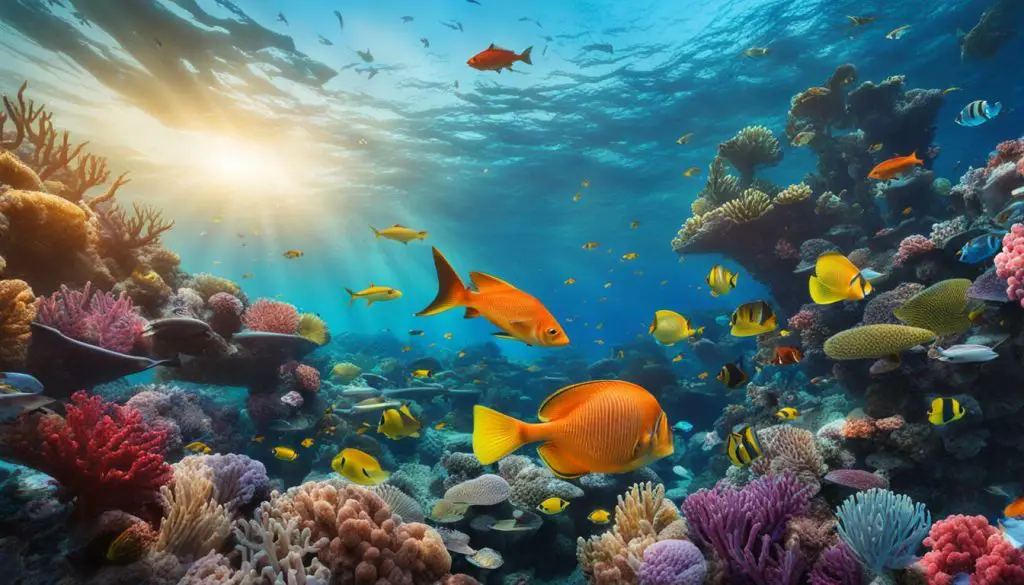Marine conservation is an important and growing field of work that aims to protect and preserve the health of our oceans and the species that inhabit them. With increasing awareness of environmental issues and the need for sustainable practices, the demand for professionals in the marine conservation sector is growing.
If you are interested in pursuing a career in marine conservation, this guide will provide you with valuable insights into the field and the various job opportunities available.

Key Takeaways:
- Marine conservation is a growing field of work that is important for protecting the health of oceans and their ecosystems.
- Career opportunities in marine conservation are diverse and can be found in government agencies, non-profit organizations, research institutions, and private companies.
- Skills and education requirements for marine conservation careers may include a strong understanding of marine ecosystems, knowledge of conservation principles and strategies, data analysis and research skills, and communication and outreach abilities.
- The job market for marine conservation professionals varies by location, industry demand and economic conditions, with competition for positions being strong in popular coastal areas or highly specialized roles.
- Networking and involvement in professional organizations can be beneficial for individuals pursuing a career in marine conservation.
What is Marine Conservation?
Before discussing the job prospects in marine conservation, it is important to understand what marine conservation is. Marine conservation refers to the protection and preservation of marine ecosystems, including the plants, animals, and habitats within them. It involves efforts to prevent or mitigate human-induced threats such as pollution, overfishing, habitat destruction, and climate change.
As a career or profession, marine conservation focuses on applying scientific principles and management strategies to protect and restore our marine resources. Professionals in this field work to develop policies, conduct scientific research, and engage in outreach and education efforts to promote sustainable practices.
The marine conservation job market is driven by a need for conservation professionals to address the challenges faced by our oceans. As awareness grows around the importance of protecting our marine resources, more and more individuals are seeking out careers in this field. The growing demand for professionals in this sector creates a wide range of job opportunities, making marine conservation an attractive career path for many.
Importance of Marine Conservation
Marine conservation is a vital aspect of preserving the health and diversity of our planet's oceans. The oceans cover over 70% of the Earth's surface and are home to a vast array of marine species, as well as supporting important economic, cultural, and recreational activities.
Conservation efforts are necessary to ensure the sustainability of marine resources and to mitigate the impact of human-induced threats such as pollution, overfishing, habitat destruction, and climate change. By protecting and restoring marine ecosystems, we can maintain biodiversity, support fisheries, protect endangered species, maintain water quality, and protect against the harmful effects of climate change.
The importance of marine conservation creates a demand for professionals in this field. Careers in marine conservation offer diverse opportunities, from research and monitoring to policy and advocacy. By pursuing a career in marine conservation, individuals can make a significant impact on the health of our oceans while enjoying a fulfilling and rewarding profession.
Job Opportunities in Marine Conservation
The field of marine conservation offers a wide range of job opportunities for individuals passionate about protecting and preserving marine ecosystems. These opportunities can be found in government agencies, non-profit organizations, research institutions, and private companies.
Marine conservation scientists and marine biologists work in research institutions, government agencies, and non-profit organizations. Their job responsibilities include conducting research to determine the cause of problems in aquatic ecosystems, developing and implementing conservation strategies, and monitoring the progress and effectiveness of conservation efforts. Environmental consultants provide expertise to private companies, government agencies, and non-profit organizations on environmental issues related to marine conservation.
Marine policy analysts work for government agencies and non-profit organizations and are responsible for analyzing laws and regulations related to marine conservation, recommending policy changes, and promoting policies that protect and preserve marine ecosystems. Marine educators work in aquariums, marine parks, and non-profit organizations and are responsible for educating the public about marine conservation issues, teaching about the importance of preserving marine ecosystems, and introducing people to marine life and habitats.
Marine park rangers work in national parks and other protected marine areas and are responsible for enforcing laws and regulations aimed at protecting marine ecosystems. They may also be involved in educating visitors about the importance of conservation efforts.
Overall, the job market for marine conservation is growing, and job opportunities can be found in a variety of sectors. However, competition for positions can be strong, particularly in popular coastal areas or highly specialized roles. Staying updated with current trends, gaining relevant experience, and completing an advanced degree or certification can enhance job prospects and make candidates more competitive in the job market.
Careers in Marine Conservation
A career in marine conservation is an excellent opportunity for individuals who are passionate about protecting and preserving marine ecosystems. The field offers a wide range of career paths, allowing individuals with different skills and interests to choose a fulfilling and challenging profession.
Marine conservation careers can include research and monitoring, policy and advocacy, education and outreach, conservation planning, and marine resource management. Individuals in this field work to prevent or mitigate human-induced threats such as pollution, overfishing, habitat destruction, and climate change.
Research and monitoring roles involve studying marine ecosystems to better understand their health and the impact of human activities. Policy and advocacy roles focus on developing and implementing policies to protect marine resources and advocating for change. Education and outreach roles involve educating the public about the importance of marine conservation and inspiring action. Conservation planning roles focus on designing and implementing conservation projects. Marine resource management roles involve managing marine resources sustainably, for example, through fisheries management.
To pursue a career in marine conservation, individuals typically require a strong understanding of marine ecosystems, knowledge of conservation principles and strategies, data analysis and research skills, communication and outreach abilities, and a background in biology, ecology, marine science, or a related field. Some positions may also require specific certifications or advanced degrees.
Marine conservation careers offer the opportunity to make a tangible impact on the health of our oceans and contribute to the long-term sustainability of marine resources. Salaries in this field can vary depending on various factors such as job role, experience, education level, and organization type. Entry-level positions may have lower salaries, but as individuals gain experience and specialize, salaries typically increase.
It is essential to network and stay involved in professional organizations to enhance job prospects and stay updated with current trends. Some notable organizations in the field of marine conservation include the Marine Conservation Society, The Ocean Foundation, Sea Shepherd Conservation Society, and the National Oceanic and Atmospheric Administration (NOAA).
Required Skills and Education
To pursue a career in marine conservation, individuals need to have certain skills and education. A solid understanding of marine ecosystems and conservation principles is essential. Additionally, data analysis and research skills are valued, along with communication and outreach abilities. A background in biology, ecology, marine science, or a related field is typically required for most positions in the field.
Some careers in marine conservation may require specific certifications or advanced degrees. For example, becoming a marine mammal trainer may require a degree in psychology or animal science, and certification from a professional organization such as the International Marine Animal Trainers Association (IMATA).
Individuals pursuing a career in marine conservation should also consider gaining relevant experience through internships, volunteer work, or research assistantships. This can help build a strong resume and enhance job prospects.
Skills Required for a Career in Marine Conservation
Some of the key skills required for a career in marine conservation are:
- Knowledge of marine ecosystems: Understanding the complexities of marine ecosystems and how they function is essential in marine conservation.
- Data analysis and research skills: The ability to analyze data and conduct research is critical in many roles in marine conservation, such as conservation scientists and marine biologists.
- Communication and outreach: Being able to effectively communicate conservation goals and strategies to stakeholders, policymakers, and the general public is key to the success of marine conservation efforts.
- Conservation principles and strategies: Knowledge of conservation principles such as habitat restoration, species recovery, and pollution prevention is vital to the success of marine conservation efforts.
By acquiring these skills and education, individuals can pursue a rewarding career in marine conservation and contribute to the health and sustainability of our ocean ecosystems.
Job Market and Prospects
The job market for marine conservation professionals varies depending on location, industry demand, and economic conditions. While the demand for professionals in this field is growing, competition for positions can be strong, especially in popular coastal areas or highly specialized roles.
Individuals interested in pursuing a career in marine conservation should stay updated with current trends and be willing to gain relevant experience to enhance job prospects. Employers often look for candidates with a strong understanding of marine ecosystems, knowledge of conservation principles and strategies, data analysis and research skills, communication and outreach abilities, and a background in biology, ecology, marine science, or a related field. Some positions may also require specific certifications or advanced degrees.
Prospects for future growth and stability within the marine conservation job market are increasingly positive. As awareness of environmental issues continue to gain momentum and a need for sustainable practices grows, professionals in this sector can expect an increase in demand for their skills and expertise.
Salary Range and Benefits
The salary range in marine conservation can vary widely depending on various factors, including job role, experience, education, and organization type. Entry-level positions may have lower salaries, but as individuals gain experience and specialize in their field, salaries typically increase. Similarly, salaries can vary significantly based on the location and industry demand.
In addition to regular compensation, marine conservation employment often comes with additional benefits such as health insurance, retirement plans, paid time off, and opportunities for professional development and advancement. Non-profit organizations, in particular, may offer unique benefits such as flexible work hours and the satisfaction of working towards a meaningful cause.
It is worth noting that job opportunities in marine conservation can be competitive, and salaries may not always meet the expectations of some professionals. However, pursuing a career in marine conservation offers unique benefits beyond just financial compensation. The opportunity to work towards a noble cause and make a meaningful difference in the world is a significant draw for many individuals.
Networking and Professional Organizations
Networking and involvement in professional organizations can provide numerous benefits for individuals interested in pursuing a career in marine conservation. By building a professional network and staying up-to-date with the latest industry trends and innovations, individuals can enhance their job prospects and advance their careers.
One notable organization in the marine conservation profession is the Marine Conservation Society. This UK-based organization is dedicated to the protection and preservation of marine ecosystems and offers a variety of opportunities for involvement, including volunteering, education programs, and research projects.
The Ocean Foundation is another prominent organization in the field of marine conservation. This US-based organization focuses on collaborative solutions to ocean conservation challenges and offers programs in areas such as marine wildlife protection, sustainable seafood, and ocean acidification.
Sea Shepherd Conservation Society is an international non-profit organization that is dedicated to protecting marine wildlife and habitats through direct action campaigns and initiatives. The organization has been involved in a number of high-profile marine conservation efforts and offers a variety of opportunities for involvement and support.
The National Oceanic and Atmospheric Administration (NOAA) is another key player in the marine conservation field. This US government agency is responsible for monitoring and managing marine resources and ecosystems and offers a variety of job opportunities and educational resources for individuals interested in this field.
By joining professional organizations such as these, individuals can connect with like-minded professionals, stay informed about industry news and trends, and gain access to valuable resources and career opportunities.
Conclusion
Marine conservation is a growing field that offers a rewarding career path for individuals passionate about protecting our oceans. The importance of marine conservation and the demand for professionals in this sector make it an exciting time to explore job opportunities in marine conservation. With a diverse range of career paths, including research, policy, education, and management, individuals can find a career that aligns with their interests and skills.
To pursue a career in marine conservation, individuals should aim to acquire the necessary skills, education, and experience. This may include a background in marine science, a strong understanding of conservation principles, data analysis and research skills, and communication abilities. While the job market for marine conservation can be competitive, staying updated with current trends and gaining relevant experience can enhance job prospects.
Networking and involvement in professional organizations can also be beneficial for individuals pursuing a career in marine conservation. These networks provide opportunities for professional development, knowledge sharing, job postings, and collaborations. Notable organizations in the field of marine conservation include the Marine Conservation Society, The Ocean Foundation, Sea Shepherd Conservation Society, and the National Oceanic and Atmospheric Administration (NOAA).
Overall, marine conservation offers an exciting and fulfilling profession for those passionate about the health and sustainability of our oceans. By contributing to the protection and preservation of marine ecosystems, individuals can make a positive impact on our planet while enjoying a rewarding career.
FAQ
Is marine conservation a job?
Yes, marine conservation offers various job opportunities for individuals passionate about protecting and preserving marine ecosystems.
What is marine conservation?
Marine conservation refers to the protection and preservation of marine ecosystems, including the plants, animals, and habitats within them.
Why is marine conservation important?
Marine conservation is crucial for maintaining the health and diversity of our planet's oceans, supporting fisheries, protecting endangered species, and mitigating the impacts of climate change.
What are the job opportunities in marine conservation?
Job opportunities in marine conservation can be found in government agencies, non-profit organizations, research institutions, and private companies. Common job roles include marine biologist, conservation scientist, environmental consultant, marine policy analyst, marine educator, and marine park ranger.
What are the career options in marine conservation?
Depending on individual interests and skills, career paths in marine conservation can include research and monitoring, policy and advocacy, education and outreach, conservation planning, and marine resource management.
What skills and education are required for a career in marine conservation?
Typically, a strong understanding of marine ecosystems, knowledge of conservation principles, research skills, communication abilities, and a background in biology, ecology, or marine science are required. Some positions may also require specific certifications or advanced degrees.
What is the job market and prospects for marine conservation?
The job market for marine conservation is growing due to increased awareness of environmental issues. However, competition for positions can be strong, especially in popular coastal areas or highly specialized roles. Staying updated with current trends and gaining relevant experience can enhance job prospects.
What is the salary range and benefits in marine conservation?
The salary range in marine conservation varies depending on factors such as job role, experience, education level, and organization type. Benefits can include health insurance, retirement plans, paid time off, and opportunities for professional development and advancement.
Are there networking opportunities and professional organizations in marine conservation?
Yes, networking and involvement in professional organizations can be beneficial in the marine conservation field. Organizations such as the Marine Conservation Society, The Ocean Foundation, Sea Shepherd Conservation Society, and the National Oceanic and Atmospheric Administration (NOAA) provide networking, knowledge sharing, and job opportunities.
What can I conclude about a career in marine conservation?
A career in marine conservation offers the opportunity to make a tangible impact on the health of our oceans. With diverse job opportunities, a growing demand for professionals, and the importance of protecting marine ecosystems, pursuing a career in marine conservation can be fulfilling and rewarding.
Latest Posts
- Royal Windermere Yacht Club Review
 Did you know Lake Windermere is England's biggest lake? It's 10.5 miles long and 1 mile wide. This beautiful lake is home to the famous Royal Windermere Yacht Club. It's one of the UK's top sailing clubs, making it a great spot for sailing fans and those who love being on the water. The Royal… Read more: Royal Windermere Yacht Club Review
Did you know Lake Windermere is England's biggest lake? It's 10.5 miles long and 1 mile wide. This beautiful lake is home to the famous Royal Windermere Yacht Club. It's one of the UK's top sailing clubs, making it a great spot for sailing fans and those who love being on the water. The Royal… Read more: Royal Windermere Yacht Club Review - Coquet Yacht Club Review
 Welcome to the Coquet Yacht Club in Amble, UK. It's known for its yachting community and great marina. Also, see why this club is so well-loved. The Coquet Yacht Club has over 500 members who love boating. They come from many different backgrounds but share a passion for sailing. This club has a long history… Read more: Coquet Yacht Club Review
Welcome to the Coquet Yacht Club in Amble, UK. It's known for its yachting community and great marina. Also, see why this club is so well-loved. The Coquet Yacht Club has over 500 members who love boating. They come from many different backgrounds but share a passion for sailing. This club has a long history… Read more: Coquet Yacht Club Review - Coniston Sailing Club Review
 Did you know about the Coniston Sailing Club in the stunning Lake District? It offers many services and activities for all sailing lovers. The club's beautiful location and great facilities make it a top pick for sailing in the UK. At Coniston Sailing Club, you can learn to sail, hire a boat, or join fun… Read more: Coniston Sailing Club Review
Did you know about the Coniston Sailing Club in the stunning Lake District? It offers many services and activities for all sailing lovers. The club's beautiful location and great facilities make it a top pick for sailing in the UK. At Coniston Sailing Club, you can learn to sail, hire a boat, or join fun… Read more: Coniston Sailing Club Review - St Andrews Sailing Club Review
 Did you know sailing is growing fast in the UK? More people are discovering the joy of sailing. If you love sailing or want to learn, check out St Andrews Sailing Club. The club has something for everyone. From beginners to experts, you can learn and have fun. Their instructors teach you everything about sailing… Read more: St Andrews Sailing Club Review
Did you know sailing is growing fast in the UK? More people are discovering the joy of sailing. If you love sailing or want to learn, check out St Andrews Sailing Club. The club has something for everyone. From beginners to experts, you can learn and have fun. Their instructors teach you everything about sailing… Read more: St Andrews Sailing Club Review - Derwent Reservoir Sailing Club Review
 Did you know that Derwent Reservoir in Northumberland is famous for both calm walks and exciting water sports? The Derwent Reservoir Sailing Club is loved by many. Families, water sports fans, and those who love adventure come here. The club is in Blanchland, Consett, a nice place for all. Imagine paddle boarding, dinghy sailing, windsurfing,… Read more: Derwent Reservoir Sailing Club Review
Did you know that Derwent Reservoir in Northumberland is famous for both calm walks and exciting water sports? The Derwent Reservoir Sailing Club is loved by many. Families, water sports fans, and those who love adventure come here. The club is in Blanchland, Consett, a nice place for all. Imagine paddle boarding, dinghy sailing, windsurfing,… Read more: Derwent Reservoir Sailing Club Review - Loch Venachar Sailing Club Review
 Welcome to Loch Venachar Sailing Club, an exciting place! Loch Venachar is in the Trossachs National Park, a top spot in the Scottish Highlands for sailing fans. This club teems with beautiful sights and fun activities, making it a perfect spot for all. Join in the fun at Loch Venachar Sailing Club with sailing lessons… Read more: Loch Venachar Sailing Club Review
Welcome to Loch Venachar Sailing Club, an exciting place! Loch Venachar is in the Trossachs National Park, a top spot in the Scottish Highlands for sailing fans. This club teems with beautiful sights and fun activities, making it a perfect spot for all. Join in the fun at Loch Venachar Sailing Club with sailing lessons… Read more: Loch Venachar Sailing Club Review - Cardwell Bay Sailing Club Review
 Did you know that sailing is not just thrilling, but also helps you see the coast's beauty? It is well-loved by water lovers around the world. Cardwell Bay Sailing Club is here for you, offering amazing sailing adventures. The club is at the gorgeous Cardwell Bay marina. It's perfect for beginners and experienced sailors alike.… Read more: Cardwell Bay Sailing Club Review
Did you know that sailing is not just thrilling, but also helps you see the coast's beauty? It is well-loved by water lovers around the world. Cardwell Bay Sailing Club is here for you, offering amazing sailing adventures. The club is at the gorgeous Cardwell Bay marina. It's perfect for beginners and experienced sailors alike.… Read more: Cardwell Bay Sailing Club Review - Clyde Corinthian Yacht Club Review
 Did you know the Clyde Corinthian Yacht Club is over 140 years old? Since 1877, this club on the west coast of Scotland has welcomed sailing fans. It's a place where both new and experienced sailors come together. The club is known worldwide for its excellence in sailing. The club has great facilities like a… Read more: Clyde Corinthian Yacht Club Review
Did you know the Clyde Corinthian Yacht Club is over 140 years old? Since 1877, this club on the west coast of Scotland has welcomed sailing fans. It's a place where both new and experienced sailors come together. The club is known worldwide for its excellence in sailing. The club has great facilities like a… Read more: Clyde Corinthian Yacht Club Review - Ullswater Yacht Club Review
 The Lake District isn't just about beautiful views. It's also a top place for sailing. Ullswater Yacht Club brings together sailing fans to enjoy the calm and excitement of sailing. It sits in the lovely Lake District. Here, you can join regattas, rent boats, or take sailing classes. This club is known for its great… Read more: Ullswater Yacht Club Review
The Lake District isn't just about beautiful views. It's also a top place for sailing. Ullswater Yacht Club brings together sailing fans to enjoy the calm and excitement of sailing. It sits in the lovely Lake District. Here, you can join regattas, rent boats, or take sailing classes. This club is known for its great… Read more: Ullswater Yacht Club Review - Prestwick Sailing Club Review
 Did you know over 1.5 million people in the UK love sailing and water sports? Among these, Prestwick Sailing Club is a top choice. It's on the beautiful Ayrshire coast. Here, you can enjoy various activities, no matter your skill level. The club offers sailing lessons, boat rentals, and a great clubhouse. It also hosts… Read more: Prestwick Sailing Club Review
Did you know over 1.5 million people in the UK love sailing and water sports? Among these, Prestwick Sailing Club is a top choice. It's on the beautiful Ayrshire coast. Here, you can enjoy various activities, no matter your skill level. The club offers sailing lessons, boat rentals, and a great clubhouse. It also hosts… Read more: Prestwick Sailing Club Review - Clyde Cruising Club Review
 Did you know the Clyde Cruising Club started in 1909? It's one of Scotland's most respected sailing clubs in Scotland. For over a century, it has been central to the area's boating history and known for its wonderful sailing experiences. In the lively city of Glasgow, the Clyde Cruising Club is a key point for… Read more: Clyde Cruising Club Review
Did you know the Clyde Cruising Club started in 1909? It's one of Scotland's most respected sailing clubs in Scotland. For over a century, it has been central to the area's boating history and known for its wonderful sailing experiences. In the lively city of Glasgow, the Clyde Cruising Club is a key point for… Read more: Clyde Cruising Club Review - Dalgety Bay Sailing Club Review
 On the north shore of the Firth of Forth, about three miles east of the Forth Rail Bridge, you'll find Dalgety Bay Sailing Club nestled in its own spacious coastal area with a convenient high tide access harbour. The WyndDalgety BayDunfermlineFifeKY11 9SJ Author John Sixthsmith I'm a freelance writer and avid sailor who loves to… Read more: Dalgety Bay Sailing Club Review
On the north shore of the Firth of Forth, about three miles east of the Forth Rail Bridge, you'll find Dalgety Bay Sailing Club nestled in its own spacious coastal area with a convenient high tide access harbour. The WyndDalgety BayDunfermlineFifeKY11 9SJ Author John Sixthsmith I'm a freelance writer and avid sailor who loves to… Read more: Dalgety Bay Sailing Club Review - Royal Forth Yacht Club Review
 The Royal Forth Yacht Club is a well-established water-sports club with over 150 years of history. Located in Granton Harbour near Edinburgh, the Club offers easy access to the beautiful sailing waters of the Firth of Forth. Members can participate in a variety of racing and cruising activities, with access to fully serviced moorings and… Read more: Royal Forth Yacht Club Review
The Royal Forth Yacht Club is a well-established water-sports club with over 150 years of history. Located in Granton Harbour near Edinburgh, the Club offers easy access to the beautiful sailing waters of the Firth of Forth. Members can participate in a variety of racing and cruising activities, with access to fully serviced moorings and… Read more: Royal Forth Yacht Club Review - Port Edgar Yacht Club Review
 Port Edgar Yacht Club is situated in South Queensferry, near the iconic Forth Bridges, making it easily accessible within a 60-minute drive for most individuals in the Central Belt. Whether you are new to the area, have recently completed an RYA course, or simply wish to return to sailing, they are there to assist you.… Read more: Port Edgar Yacht Club Review
Port Edgar Yacht Club is situated in South Queensferry, near the iconic Forth Bridges, making it easily accessible within a 60-minute drive for most individuals in the Central Belt. Whether you are new to the area, have recently completed an RYA course, or simply wish to return to sailing, they are there to assist you.… Read more: Port Edgar Yacht Club Review - Cramond Boat Club Review
 The Cramond Boat Club is located at the mouth of the River Almond, just four miles from the bustling centre of Edinburgh. Our Clubhouse and moorings provide a welcoming home for a variety of small craft, from dinghies to small cruisers and motorboats. The River Almond offers tidal access to the Firth of Forth for… Read more: Cramond Boat Club Review
The Cramond Boat Club is located at the mouth of the River Almond, just four miles from the bustling centre of Edinburgh. Our Clubhouse and moorings provide a welcoming home for a variety of small craft, from dinghies to small cruisers and motorboats. The River Almond offers tidal access to the Firth of Forth for… Read more: Cramond Boat Club Review - Discover Dinghy Sailing Holidays Adventure!
 Are you ready for an unforgettable vacation experience? Imagine gliding across crystal-clear waters, feeling the wind in your hair, and exploring hidden coves and breath-taking coastlines. Dinghy sailing holidays offer a unique adventure that brings together the thrill of sailing with the serenity of being surrounded by nature. But what exactly are dinghy sailing holidays… Read more: Discover Dinghy Sailing Holidays Adventure!
Are you ready for an unforgettable vacation experience? Imagine gliding across crystal-clear waters, feeling the wind in your hair, and exploring hidden coves and breath-taking coastlines. Dinghy sailing holidays offer a unique adventure that brings together the thrill of sailing with the serenity of being surrounded by nature. But what exactly are dinghy sailing holidays… Read more: Discover Dinghy Sailing Holidays Adventure! - Experience the Majesty: Sailing Alaska Adventures
 Are you ready to set sail and discover the untamed beauty of Alaska? Have you ever wondered what it's like to navigate through icy fjords, witness breathtaking wildlife, and experience the thrill of the open sea in one of the most awe-inspiring destinations on Earth? Get ready for an unforgettable adventure as we take you… Read more: Experience the Majesty: Sailing Alaska Adventures
Are you ready to set sail and discover the untamed beauty of Alaska? Have you ever wondered what it's like to navigate through icy fjords, witness breathtaking wildlife, and experience the thrill of the open sea in one of the most awe-inspiring destinations on Earth? Get ready for an unforgettable adventure as we take you… Read more: Experience the Majesty: Sailing Alaska Adventures - Set Sail on Learn to Sail Holidays Adventure
 Are you ready to embark on an unforgettable adventure and discover the thrill of sailing? Imagine mastering the art of navigating the open waters while exploring breathtaking destinations around the world. Whether you're a beginner or have some sailing experience, learn to sail holidays offer the perfect opportunity to embark on a new voyage of… Read more: Set Sail on Learn to Sail Holidays Adventure
Are you ready to embark on an unforgettable adventure and discover the thrill of sailing? Imagine mastering the art of navigating the open waters while exploring breathtaking destinations around the world. Whether you're a beginner or have some sailing experience, learn to sail holidays offer the perfect opportunity to embark on a new voyage of… Read more: Set Sail on Learn to Sail Holidays Adventure - Greek Sailing Holidays – Unwind on the Aegean
 Have you ever dreamed of sailing through the turquoise waters of the Aegean Sea, exploring the enchanting Greek islands at your own pace? Picture yourself immersing in the captivating beauty of hidden coves, basking in the warm Mediterranean sun, and experiencing the rich cultural heritage that Greece has to offer. Well, it's time to turn… Read more: Greek Sailing Holidays – Unwind on the Aegean
Have you ever dreamed of sailing through the turquoise waters of the Aegean Sea, exploring the enchanting Greek islands at your own pace? Picture yourself immersing in the captivating beauty of hidden coves, basking in the warm Mediterranean sun, and experiencing the rich cultural heritage that Greece has to offer. Well, it's time to turn… Read more: Greek Sailing Holidays – Unwind on the Aegean - Understanding What Are Marine Conservation Areas: A Guide
 Marine conservation areas are protected ocean spaces designated to preserve marine environments and their inhabitants. These areas are established to help regulate human activities and promote sustainable practices that maintain the health and productivity of ocean ecosystems. Marine conservation areas play a crucial role in preserving marine biodiversity and protecting vulnerable species. By designating specific… Read more: Understanding What Are Marine Conservation Areas: A Guide
Marine conservation areas are protected ocean spaces designated to preserve marine environments and their inhabitants. These areas are established to help regulate human activities and promote sustainable practices that maintain the health and productivity of ocean ecosystems. Marine conservation areas play a crucial role in preserving marine biodiversity and protecting vulnerable species. By designating specific… Read more: Understanding What Are Marine Conservation Areas: A Guide - Exploring Success Stories with Marine Conservation: Key Insights
 In recent years, marine conservation efforts have gained significant momentum, with organizations and individuals around the world taking action to restore the health of our oceans and protect marine life. In this article, we will delve into inspiring examples of marine conservation and showcase successful marine conservation projects through case studies and real-life stories. We… Read more: Exploring Success Stories with Marine Conservation: Key Insights
In recent years, marine conservation efforts have gained significant momentum, with organizations and individuals around the world taking action to restore the health of our oceans and protect marine life. In this article, we will delve into inspiring examples of marine conservation and showcase successful marine conservation projects through case studies and real-life stories. We… Read more: Exploring Success Stories with Marine Conservation: Key Insights - Solutions Explored: What Can We Do About Marine Conservation
 Our oceans are essential for sustaining life on our planet, providing us with food, oxygen, and regulating our climate. However, our oceans face numerous threats such as overfishing, climate change, and pollution, which jeopardize the health and survival of marine life and the overall ecosystem. It's time we take action to protect our oceans and… Read more: Solutions Explored: What Can We Do About Marine Conservation
Our oceans are essential for sustaining life on our planet, providing us with food, oxygen, and regulating our climate. However, our oceans face numerous threats such as overfishing, climate change, and pollution, which jeopardize the health and survival of marine life and the overall ecosystem. It's time we take action to protect our oceans and… Read more: Solutions Explored: What Can We Do About Marine Conservation - Discover Who is the Father of Marine Conservation Today
 Environmental preservation has become a pressing issue in recent times, with marine conservation at the forefront of efforts to protect our oceans and marine life. It is only through the tireless efforts of pioneers, trailblazers, and visionaries that we have come to understand the critical importance of preserving our planet's marine ecosystems. In this section,… Read more: Discover Who is the Father of Marine Conservation Today
Environmental preservation has become a pressing issue in recent times, with marine conservation at the forefront of efforts to protect our oceans and marine life. It is only through the tireless efforts of pioneers, trailblazers, and visionaries that we have come to understand the critical importance of preserving our planet's marine ecosystems. In this section,… Read more: Discover Who is the Father of Marine Conservation Today - Understanding What Are Marine Conservation Zones: A Guide
 Marine ecosystems cover more than two-thirds of our planet and are an essential part of our lives. They provide us with food, oxygen, and countless other resources. However, human activities such as overfishing, pollution, and habitat destruction have put immense pressure on these ecosystems, threatening their health and sustainability. To address these issues, marine conservation… Read more: Understanding What Are Marine Conservation Zones: A Guide
Marine ecosystems cover more than two-thirds of our planet and are an essential part of our lives. They provide us with food, oxygen, and countless other resources. However, human activities such as overfishing, pollution, and habitat destruction have put immense pressure on these ecosystems, threatening their health and sustainability. To address these issues, marine conservation… Read more: Understanding What Are Marine Conservation Zones: A Guide - Understanding What is Marine Conservation: A Quick Guide
 Marine conservation refers to the protection and preservation of marine ecosystems and the species that inhabit them. It involves various efforts made by organizations and individuals to ensure the long-term sustainability of our valuable marine resources. Marine conservation strategies aim to reduce the negative impacts of human activities on marine ecosystems, such as overfishing, habitat… Read more: Understanding What is Marine Conservation: A Quick Guide
Marine conservation refers to the protection and preservation of marine ecosystems and the species that inhabit them. It involves various efforts made by organizations and individuals to ensure the long-term sustainability of our valuable marine resources. Marine conservation strategies aim to reduce the negative impacts of human activities on marine ecosystems, such as overfishing, habitat… Read more: Understanding What is Marine Conservation: A Quick Guide


























